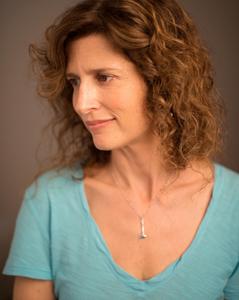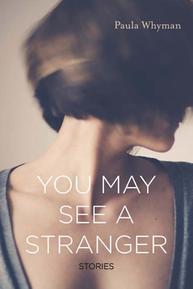
|
|
| photo: Curt Richter | |
Paula Whyman's debut linked story collection, You May See a Stranger, is published by TriQuarterly Books/Northwestern University Press (May 15, 2016). Her stories have appeared in journals including McSweeney's Quarterly, Virginia Quarterly Review, Ploughshares and The Hudson Review. Whyman is a member of the MacDowell Colony Fellows Executive Committee. A music theater piece, "Transfigured Night," based on a story in her debut collection, is in development with composer Scott Wheeler.
On your nightstand now:
I read many books at once. Right now I'm alternating among these:
The Good Soldier by Ford Madox Ford (rereading); Between the World and Me by Ta-Nehisi Coates; The State We're In by Ann Beattie; Half an Inch of Water by Percival Everett; and The Visiting Privilege by Joy Williams
On the soon-to-be-read pile: Some Hope, the third book in the Patrick Melrose series by Edward St. Aubyn, and Random Family by Adrian Nicole LeBlanc.
Favorite book when you were a child:
Miss Twiggley's Tree by Dorothea Warren Fox, about a painfully shy woman who lives in a tree with two bears and a dog. She's so shy, she sends the dog into town to do the grocery shopping. After a flood occurs, she must save the townspeople by inviting them to stay temporarily in her tree. She's forced to get past her discomfort. For a socially anxious child, this was an inspiring example. The illustrations are fabulously witty. I've never met anyone among my contemporaries who remembers reading this book. I daydream that somewhere there's a small, secret fan club that meets, appropriately, in a tree house, where you can play chess with bears. "They shed on the sofa, she said, but who cares?"
Your top five authors:
Impossible to choose only five, but I'll try: Philip Roth, Lorrie Moore, Virginia Woolf, George Eliot, Gabriel García Márquez.
Book you've faked reading:
I wrote a paper on Moby-Dick in high school after reading only the first 80 pages. I got a C. I have since read the entire book. I swear. I appreciated it a lot more in graduate school, when I was surprised to discover that there are funny parts. As for a book I've pretended to have read as an adult? I used to nod my head as if I knew what happened halfway through Infinite Jest. I've read the first 50 pages. I readily admit my ignorance and await the flurry of appalled protests. I do, however, love David Foster Wallace's essays and short stories.  Book you're an evangelist for:
Book you're an evangelist for:
In nonfiction, Song of the Dodo by David Quammen, about island biogeography and its applicability to the discussion of extinctions everywhere. It turns out that you don't have to be on an island per se to be living on an island, if you happen to be a species whose habitat has been artificially restricted, say, by the activities of man. It was published in 1996. I don't believe its message is dated.
In fiction, I encourage everyone to read Moon Tiger by Penelope Lively. It won the Booker in 1987, but I know relatively few people who've read it. It is narrated by an elderly popular historian who is trying to explain her own colorful life history. The book's structure is more weblike than chronological, which appeals to me. As the narrator says, "Chronology irritates me. There is no chronology inside my head."
Book you've bought for the cover:
I hope someone buys my book for the cover. I can't recall ever doing that. On the other hand, it's possible I've decided not to pick up a book because of the cover. I don't like shiny things.
Book you hid from your parents:
The one I wrote. Jig is up now, though.
I never had to hide a book from my parents. They were always thrilled that I was reading and slightly oblivious as to the content. I'm pretty sure they thought Flowers in the Attic was about gardening.
Book that changed your life:
I think I read something that changes my life every few years, but perhaps the first one was the series The Chronicles of Narnia by C.S. Lewis. I wanted so much for it to be true that anytime I saw a wardrobe, I'd climb inside it and feel around the back, but I'd only get tangled up in coats. In fact, this happened just last week at a party; a little embarrassing. Books, I realized, could convince you of the existence of an alternate reality. How cool is that?
Favorite line from a book:
"Too many conflicting emotional interests are involved for life ever to be wholly acceptable, and possibly it is the work of the storyteller to rearrange things so that they conform to this end. In any case, in talking about the past we lie with every breath we draw." --William Maxwell, So Long, See You Tomorrow
Five books you'll never part with:
My heavily annotated grad school copy of The Waves by Virginia Woolf.
A Saturday Night Live script book from 1977.
Signed, personalized copies of Grace Paley's Collected Stories and James Salter's Dusk and Other Stories.
And Miss Twiggley, obviously.
Book you most want to read again for the first time:
To the Lighthouse by Virginia Woolf. It might have been the first novel of hers that I read. (I'd read some of her famous essays before I read her fiction.) It was a revelation to me--the structure, the voice, the language. And the interlude--"Time Passes," the telegraphing of the future. I didn't know you could mark time that way in a novel.
What you would do if you did not write fiction:
I would be a conservation biologist. In other words, another frustrating profession with a high rate of failure and a low rate of financial reward, in which one must take comfort in the small successes; however, even those small successes seem to have the potential for a greater impact than, say, giving people something to read while they fall asleep at night. But perhaps conservation biology, being a job that I imagine leads to sleepless nights, could benefit from the relief offered by fiction, too.

